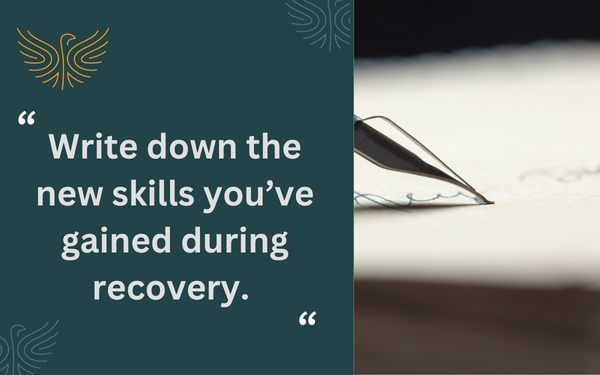Searching for work after rehab can feel daunting. The gap in your work history can feel like it's staring back at you, silently judging. Your confidence might waver as you wonder what to say about where you’ve been, and fear of judgment can make even clicking “apply” feel intimidating.
Yet, rebuilding your career is one of the most powerful ways to rebuild your life. Employment offers structure, purpose, stability, and pride—all of which reinforce your recovery. The strength, resilience, accountability, and empathy you developed in rehab are exactly the qualities many employers seek, even if they don’t yet know your full story (or maybe never will!).
You’ve already accomplished the hardest part—choosing recovery. Now, it’s time to channel that same determination into your professional journey. The following strategies will help you approach job hunting with clarity, confidence, and a renewed sense of purpose.
_______________________________________________________
1. Start by Acknowledging How Far You’ve Come
Before diving into job listings, take a moment to recognize your progress. Completing rehab isn’t just a checkbox—it's a major life accomplishment that requires courage, commitment, and hard work.
Write down the new skills you’ve gained during recovery. You’ve learned discipline through maintaining sobriety. You’ve practiced teamwork in group therapy. You’ve mastered accountability by showing up even when it was hard. You’ve developed time management by balancing treatment, meetings, and daily responsibilities. These aren't just recovery skills—they’re professional assets.

And it’s important to keep in mind that you’re not starting over—you’re starting fresh, with experience that’s made you stronger and wiser than before!
2. Choose the Right Time to Begin Job Searching
Recovery must come first. If you’re still stabilizing physically or emotionally, it’s not just okay to wait—it’s wise. Rushing into employment before you’re ready can create stress that threatens your sobriety.
Talk openly with your counselor or sponsor about your readiness for employment. They know your journey and can offer an honest perspective about timing. Once you feel grounded in your recovery routine, start with low-pressure steps. Update your resume one afternoon. Browse job listings without pressure to apply. Practice introducing yourself professionally.
3. Be Honest but Strategic About Your Past
You don’t owe anyone your full recovery story in a professional setting. Your medical history, including addiction and treatment, is private information that you control. For gaps in work history, you can simply say you were “addressing personal health matters” or “taking time for personal growth and development.” These statements are completely truthful without revealing details that aren’t relevant to your ability to do the job.
If rehabilitation comes up directly—perhaps due to background checks or specific industry requirements—keep your response brief and professional. Focus on growth rather than struggle, such as by saying “That period was a turning point that helped me develop stronger discipline and coping skills. I’m now focused on contributing my best work and building a stable career.”
Frame your recovery as an asset that’s given you maturity, perspective, and determination—qualities that make you a valuable employee.
4. Refresh Your Skills and Credentials
Time away from work might have left your skills feeling rusty, but that’s easily addressed.
Enrolling in community college courses, online certifications, or local workforce development programs shows initiative and commitment to professional growth. These activities also rebuild your confidence while filling resume gaps with productive activity.
You can even explore free and low-cost resources like Coursera, LinkedIn Learning, or your local career center. Many libraries offer free access to professional development platforms.
Alternatively, consider trade certifications or short-term programs in growing fields—healthcare support, IT, skilled trades—that offer clear pathways to employment.
5. Build a Supportive Job-Search Network
Recovery programs, alumni networks, and local job placement services specifically designed for people in recovery can open doors you didn’t know existed. Your counselor or case manager might know about employer partnerships with companies actively seeking candidates in recovery.
Additionally, you can attend job fairs to practice professional interaction in a low-stakes environment. Volunteer work can further help rebuild social confidence and can lead to employment opportunities. Online support groups for job seekers in recovery also provide encouragement, advice, and sometimes direct job leads.
6. Prepare for Interviews with Confidence
Interview anxiety is normal for anyone, but it can feel especially intense after rehab. So, practice responses to potentially sensitive questions with a counselor, sponsor, or trusted friend. They can help you formulate better answers, as well as help you feel confident going into an interview.
During the interview, keep your body language open and positive—maintain appropriate eye contact, speak with a calm tone, and let genuine enthusiasm show through.
Even recording yourself beforehand, answering common questions to identify areas for improvement. And remember: you’re interviewing them too. You’re looking for a workplace environment that aligns with and supports your recovery, not just any job that will have you.
7. Explore Second-Chance Employers and Recovery-Friendly Workplaces
Many companies actively seek to hire people in recovery, recognizing the value of second chances and the strength of those who’ve overcome addiction. Industries, such as manufacturing, construction, culinary arts, landscaping, customer service, and tech support, often participate in second-chance hiring initiatives.
In fact, many states have programs connecting employers with recovery communities, so do your research in your area! Temp agencies and transitional work programs can also help you ease back into employment while building recent work history.
8. Manage Stress and Prevent Burnout
Job searching can trigger frustration, rejection, and self-doubt—emotions that threaten recovery if not managed carefully. So, ensure you protect your sobriety by creating boundaries around job-search activities. Set specific hours for applications and networking, then step away to focus on recovery activities.
Keep attending meetings, therapy sessions, or support groups even when job searching feels urgent.
And make sure you use the stress-management tools you’ve learned, such as breathing exercises when anxiety spikes, journaling to process rejection, and physical exercise to release tension.
9. Celebrate Small Wins and Keep Perspective
Every step forward deserves recognition. Submitting an application when fear tells you not to—that’s courage. Getting a callback—that’s progress.
At times, progress may feel slow, but momentum builds gradually. Stay connected to your recovery community for encouragement when rejection stings or self-doubt creeps in. Share your wins, however small they seem. Let others remind you how far you’ve come when you can only see how far you have to go!
At the end of the day, many people successfully rebuild thriving careers after rehab—not in spite of their recovery journey, but because of the strength it’s given them. Every skill you’re developing, every lesson you’re learning, every step you’re taking is part of your comeback story.
If you’re in recovery and ready to rebuild your life, the Freedom Recovery Centers (FRC) team can help you find purpose, confidence, and the right next step toward employment. Call us at 804-635-3746 to learn about how we can help.
.svg)






.svg)

.svg)



.svg)
